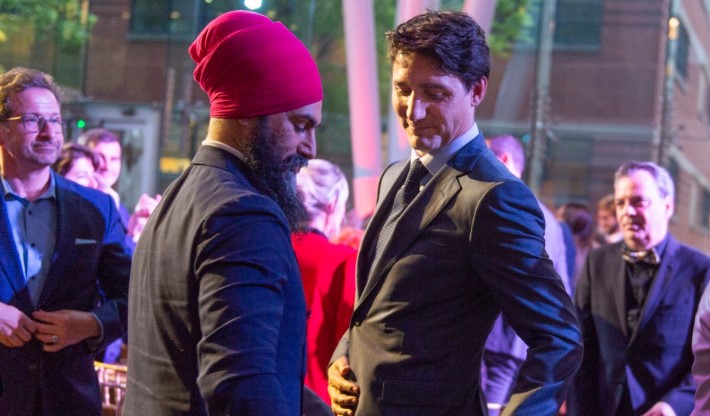Virendra Pandit
New Delhi: The so-called pro-Khalistani separatists may have lost support in India but they have successfully blackmailed the minority government of Prime Minister Justin Trudeau they support in faraway Canada to expel a top Indian diplomat and, in return, get back a top Canadian diplomat whom New Delhi expelled on Tuesday.
India announced the expulsion of a senior Canadian diplomat in a reciprocal move over Trudeau’s claim that New Delhi played a role in the June killing of a Khalistani leader, Hardeep Singh Nijjar. The unnamed Canadian diplomat has been ordered to leave India in five days.
In March 2022, Trudeau’s Liberal Party joined hands with the New Democratic Party (NDP) led by pro-Khalistani leader Jagmeet Singh, his political rival. In October 2022, the NDP openly supported the Khalistan Referendum on Canadian soil, calling it the “basic human right of Canadian Sikhs enshrined in local and international laws.”
Trudeau, under extreme pressure to save his government, claimed in Parliament on Monday that his government had “credible allegations” linking Nijjar’s killing with the “agents of the Government of India,” which New Delhi promptly rejected as “absurd and motivated.”
As Canada did, India also protested against “the interference of Canadian diplomats in our internal matters and their involvement in anti-India activities.”
Canada claimed the unnamed Indian diplomat it expelled is the head of India’s spy agency, Research and Analysis Wing (RAW).
With this tit-for-tat reaction, Canada has earned the dubious distinction of being the only country in the West and even in the East—barring Pakistan and China– to have soured relations with India. During the G-20 Summit this month, Prime Minister Narendra Modi had raised his concern with Trudeau on the Khalistani issue. This week, a hostile Canada responded by postponing its delegation’s India visit in October to discuss the long-pending Free Trade Agreement (FTA).
“Any involvement of a foreign government in the killing of a Canadian citizen on Canadian soil is an unacceptable violation of our sovereignty. It is contrary to the fundamental rules by which free, open, and democratic societies conduct themselves,” Trudeau told an emergency session of his Parliament, according to the media reports.
In a strong rebuttal, India “completely rejected” these allegations and said the Canadian politicians openly expressing sympathy for “such elements” is a matter of deep concern.
“Such unsubstantiated allegations seek to shift the focus from Khalistani terrorists and extremists, who have been provided shelter in Canada and continue to threaten India’s sovereignty and territorial integrity. The inaction of the Canadian Government on this matter has been a long-standing and continuing concern.”
The space Canada provided to a range of illegal activities, including murders, human trafficking, and organized crime is not new, India said and urged Canada to take prompt action against all “anti-India elements” operating from there.
Hardeep Singh Nijjar, who headed the Khalistani Tiger Force (KTF) and the Canadian arm of Sikhs For Justice (SFJ), was shot dead in June by unknown assailants near a Gurdwara in Surrey, Vancouver. Nijjar, who was from Punjab’s Jalandhar, moved to Canada in 1997. He was wanted in India for being the “mastermind” of the KTF, a designated terror group in India.
Last July, the Indian anti-terror agency, National Investigation Agency (NIA), announced a cash reward of Rs. 10 lakh on Nijjar in connection with the murder of a Hindu priest in Jalandhar. Nijjar was also accused in the 2007 bombing of a cinema hall in Punjab. The NIA is probing the recent attacks on Indian diplomatic missions in Canada, the UK, and the US.
Canada has for long been among the favored hubs of expatriate Sikhs, some of whom have supported extremism. The Canada-based Khalistani extremists have indulged in several violent activities recently, including protests outside the Indian Embassy and threatening Indian diplomats.
.

